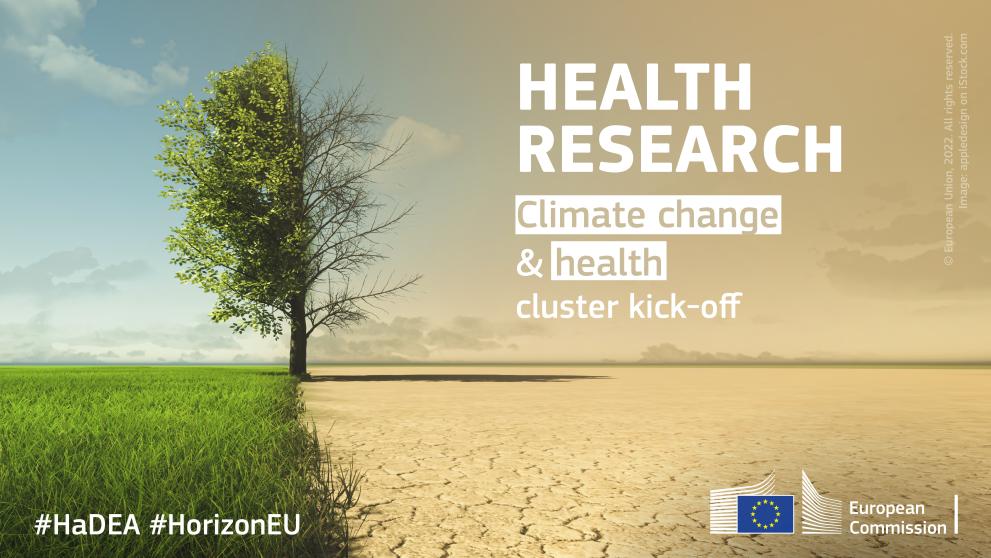
The ongoing climate crisis poses an unprecedented threat to public health. It affects our health and wellbeing through the impacts of extreme weather events, the worsening of air quality, changes in the spread of infectious diseases. It also exacerbates social inequalities, reduces food and water security and affects our mental health.
Urgent action is needed at the European and global level to minimise the ramifications of this threat and increase preparedness of health systems to deal with the ongoing changes in environmental stressors.
The Horizon Europe programme (health cluster) aims to improve and protect the health and wellbeing of citizens of all ages by generating new knowledge and developing innovative solutions via research. One of its areas of intervention, ‘Environmental and social health determinants’ , includes research on environmental stressors and development of innovative solutions to counter their effect on human health.
6 EU-funded projects forming the climate change and health cluster are researching:
- Connections between:
- Changes in environmental hazards caused by climate change,
- Climate-induced impacts on ecosystems,
- Their influence on human health;
- Climate-induced transmissions of pathogens and spread of zoonotic pathogens.
The aim of the cluster is to work together to promote synergies, knowledge sharing, avoid overlaps, increase societal and policy impact of EU-funded research in environment and health.
The cluster presented their work at the session “The health impacts of the climate crisis - New tools to support European action” at the European Health Forum Gastein (EHFG). Panellists discussed existing approaches and future opportunities to address the climate crisis, and presented the aims of each project within the cluster.
CLIMOS will bring together researchers, health-care and veterinary practitioners, technology platform designers, and at-risk communities. The project will quantify climate and environmental-related drivers of sand fly populations and the sand fly-borne diseases (SFBDs) across Europe.
The ultimate aim is to better prepare for current and future impacts of climate and environmental changes on human and animal health.
Catalyse is an interdisciplinary consortium that will provide new knowledge, data, and tools on:
- The relationships between changes in environmental hazards caused by climate change, ecosystems, and human health;
- The health co-benefits of climate action;
- The role of health evidence in decision making;
- The societal implications of climate change for health systems.
IDAlert aims to tackle the emergence and transmission of zoonotic pathogens by evaluating adaptation and mitigation strategies to build a Europe that is more resilient to emerging health threats.
The project will develop novel indicators, innovative early warning systems and efficient tools for decision-makers.
BlueAdapt will investigate the impacts of climate change on coastal waters, and assess and quantify the associated human health risks. 7 case studies across Europe will investigate different adaptation options and identify facilitators and barriers to actions to reduce human health risks from coastal pathogens. The project will also develop tools for policymakers and citizens, such as early warning systems and safe swimming apps.
TRIGGER
TRIGGER’s main objective is to identify, monitor and quantify direct and indirect impacts of climate change induced environmental hazards on human health. The project will do so by collecting health, weather-climate, environmental and socio-economic data.
HIGH Horizons
HIGH Horizons aims to identify cost-effective, integrated adaptation-mitigation interventions to alleviate heat impacts on health workers, and to reduce carbon emissions associated with health care in Africa.
If you wish to know more on public health topics such as building resilient and sustainable healthcare systems, improving infection management strategies or tackling health disparities, follow EHFG online.
Background
Horizon Europe is the research and innovation programme of the EU for the period 2021-2027. The aims of Cluster 1: Health include improving and protecting the health and well-being of citizens of all ages by generating new knowledge, developing innovative solutions and integrating where relevant a gender perspective to prevent, diagnose, monitor, treat and cure diseases. Horizon 2020 (H2020) was the EU’s multiannual funding programme between 2014 and 2020.
Relevant links
EU funded research on Environment and Health
Details
- Publication date
- 29 September 2022
- Author
- European Health and Digital Executive Agency
- Programme Sector
- Health
- Programme
- Horizon Europe
- Horizon Europe Cluster 1: Health
- Tags
- EUCancerPlan
- EUFunded
- Event
- HealthUnion
- Medical research
- Public health
